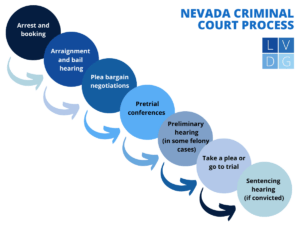Being arrested in Las Vegas can come as a shock to someone simply out for a good time. What you do and say after an arrest can do a lot to keep an unpleasant experience from turning into a nightmare.
To help you protect your rights after an arrest, our Las Vegas, Nevada criminal defense lawyers discuss the following:
- 1. What do I have to tell a Las Vegas police officer?
- 2. What should I say if I am arrested in Nevada?
- 3. What is the arrest process in Las Vegas?
1. What do I have to tell a Las Vegas police officer?
Legally, you are not obligated to tell an officer anything other than your name.1 An officer must have probable cause to arrest you, so you cannot be arrested simply because you refuse to answer questions.
In a traffic stop scenario where you are the driver, NRS 483.350 also requires you to provide your driver’s license, vehicle registration, and proof of insurance upon request.
Note that if a Las Vegas Metropolitan Police Department (LVMPD / “Metro”) or Nevada Highway Patrol (NHP) officer asks if you have a concealed weapon on your person, we recommend you disclose that you have one only if
- the weapon is legal and
- you have your current and valid CCW permit and your ID on your person
Otherwise, you are usually better off not answering. Admitting you have a weapon will justify the law enforcement officer detaining you and possibly arresting you on weapons charges.
The foregoing is not intended to constitute legal advice for your specific situation. To discuss your case with one of our Las Vegas defense attorneys, we invite you to contact us.
2. What should I say if I am arrested in Nevada?
There are two things it always makes sense to tell the police if you are arrested:
- You want to speak to your lawyer, and
- You are invoking your right to remain silent.
Contrary to what you see on TV, the police will not necessarily read you your Miranda rights immediately after an arrest or even at all. You are not entitled to a Miranda warning unless and until you:
- are in custody and
- are being officially interrogated.
Often the police will ask their questions before they arrest you (and before your Miranda rights kick in). This is why it is often best to say little or nothing during a police stop.
3. What is the arrest process in Las Vegas?
For very low-level misdemeanors, the officer may simply write you a citation to appear in court and let you go. If you are taken into custody, you will most likely be brought to:
- the Clark County Detention Center (“CCDC”) or
- possibly the Las Vegas City Jail.
Once at the CCDC or jail, you will be booked and processed. The police will:
- take your fingerprints and photo (mug shot), and
- remove your belongings from you and inventory them.
After you have been processed, you will usually have the right to post bail (assuming you have the funds). Otherwise, you will be taken before a judge within 72 judicial hours for your arraignment (where you are formally charged).

Arrested? Call us…

Call our Las Vegas, NV law firm for help. Our criminal defense attorneys offer consultations.
If you have been arrested in Las Vegas, Nevada, our caring criminal defense and DUI lawyers can help you with police interrogations, bail procedures and Nevada criminal arraignments.
We can also negotiate plea bargains with the Clark County District Attorney or bring a motion to suppress evidence based on a violation of your Miranda rights. And, if necessary, we’ll fight to secure you a “not guilty” verdict at trial.
Learn more about the definition of arrests (NRS 171.104).

